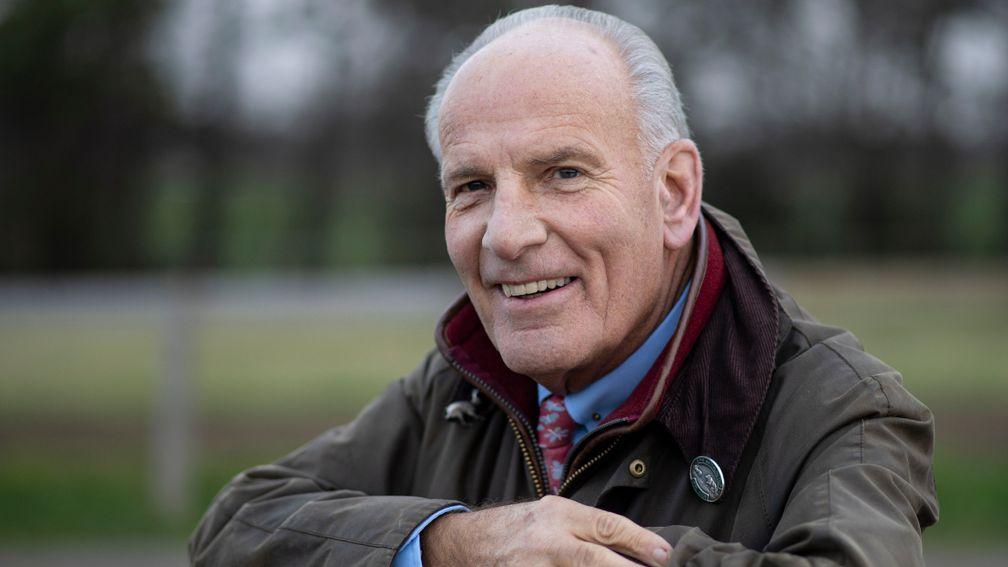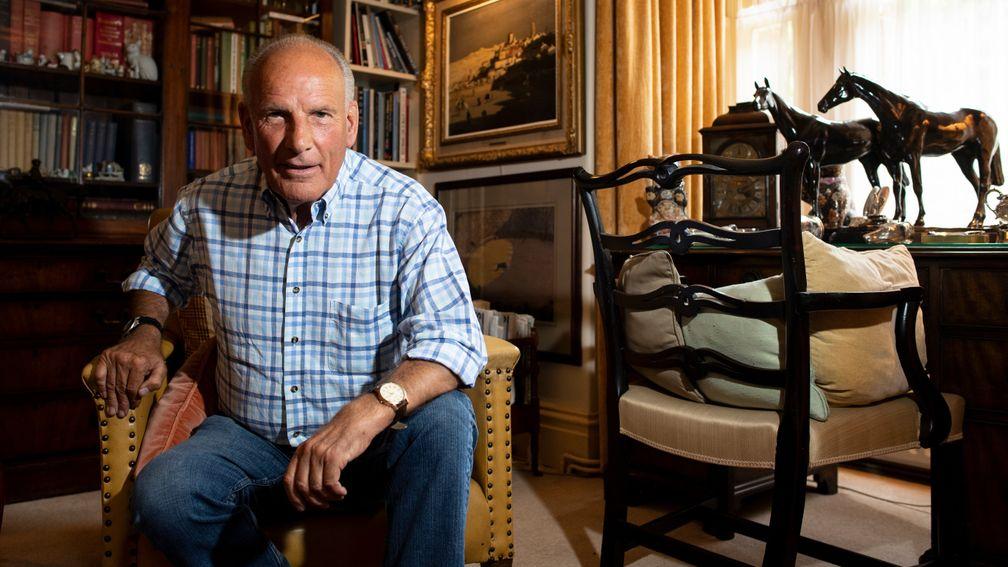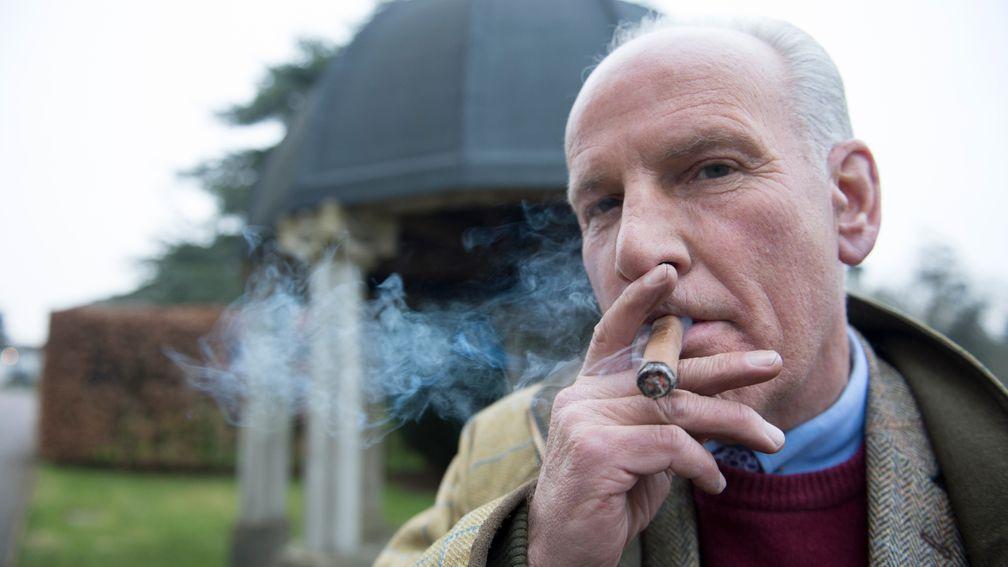When we put your questions to Sir Mark Prescott, the master of Heath House
'I'd change lots of things – for a start I'd go back and be not so horrible'

Published in the Racing Post on August 20, 2013
Will we ever see a horse repeat the performances of Spindrifter, who won 13 races as a two-year-old? How did you keep him sound and in good heart for so long a campaign?Graham Hudson
He was a tremendous horse, he made training look easy, and no horse will repeat what he did – or what Provideo and Timeless Times did for Bill O'Gorman a few years later – because the racing programme has changed. In those days [1980] there were lots of conditions races, especially ones for horses who hadn't won a race worth £2,500. I had to be clever and not win a big pot, but early that year I asked his owner Graeme Waters whether he'd like a crack at something like the Windsor Castle Stakes at Royal Ascot or would rather win a lot of races. He said he'd rather win a lot of races. Spindrifter trained himself really, he was a very hardy horse but one of relatively limited ability and his campaign just showed what careful placing could do – I exploited what he was good at, which was the ability to handle firm ground and to run freqently. Five years earlier Nagwa had won 13 races for Barry Hills, and amazingly both Nagwa and Spindrifter were bred by Joe Crowley, Aidan O'Brien's father-in-law.

Do you have any plans to retire? What will happen to Heath House when you do call it a day? Do you have any unfulfilled dreams?Michael Morley
I have no plans to retire. When I find I can no longer do the job any more, or can no longer attract owners, my assistant William Butler will step in. It'll be the owners who dictate it, frankly, when they no longer want horses with me. I don't know how eager William is to get rid of me, but on my 65th birthday earlier this year I found him and said: "I've two bits of bad news for you – first, my pension's worthless, so I can't stop work yet, and second, I came downstairs like an absolute gazelle this morning." Before I have to stop I'd love to win a British Classic – the Derby preferably.
What is your favourite brand of cigar?John Patrick
Partagas – and I smoke as many as possible.
Why don't you have runners at certain times of year? You aim to run your horses in races you think they can win – surely there must be good openings for them when the season starts.Peter Davison
The horses we run on the all-weather at the end of the year haven't been specifically trained for the all-weather, they're ones who've had hiccups, who have unfinished business. We can go on quite late with that kind of horse, with the result that in the spring I'm in no particular hurry with any of my horses. I like them to have a good rest over the winter, and if they're a bit woolly in the spring I don't mind because I know they'll come along when they're ready. In the spring I'm very slow to start working my horses. I like to leave it until they're so well I can't resist galloping them instead of trying to hurry them along before they're ready. You have to be flexible, but most horses can only compete for two-thirds of a year, you can only get that much mileage out of them. I want mine ready from May onwards, which is when the programme expands and there are more opportunities anyway.
A number of your assistants have become successful trainers, so who would you consider the best assistant at Heath House over the years? Have there been any who haven’t taken out training licences that you thought might have been very successful?Steven Clark
I take enormous pleasure from the success of my former assistants. There were three who didn't train who I knew would do very well. Simon Crisford, who was excellent – he always knew how to deal with anyone and everyone. Charlie Vigors, who runs the very successful Hillwood Stud but could just as easily have been a successful trainer. And William Balding, who is with Godolphin now. There have been many others – William Haggas, Pascal Bary, Francois Rohaut, Eoghan O'Neill, David Loder – and I know they all love to beat me in races but to be frank I'd rather be beaten by them than by anyone else. When we meet at the sales or the races they always regale me with stories about how awful I was to work for.
Enable and Sir Mark Prescott the big draws as crowds descend on Newmarket yards
How do you think master trainers from the past would compare with master trainers of today? Would Alec Taylor and John Porter, for instance, have to change their methods in order to be at the top of the tree if they were around today? And if you could have a modern-day Ormonde in your stable, what races would you target with him?Gerry Deeprose
The measure of greatness is how far ahead of the competition you are because everything gets better, the competition improves. Great trainers then would be great now, because they'd be able to incorporate another 100 years' worth of knowledge. They would be training differently if they were around today but they'd still be top of the tree. And if I had an Ormonde I'd train him for the Triple Crown because of its uniqueness, not for the Prix de l'Arc de Triomphe as contemporary horses have been aimed.
In 1965, when you were lying in that hospital bed [after breaking his back in a fall at Wye racecourse as an amateur rider], did you ever think that if you made a full recovery you would never go near a horse again, and if so what profession would you have pursued?Paul Hartley
No, I wanted to make a full recovery so I could get back to horses. If I hadn't been involved with horses I'd have liked to have been a criminal barrister. My mother loved a good murder – not literally – and when I was in hospital, to keep my mind alert, she encouraged me to write a series of articles on famous murders that had happened between 20 and 40 years earlier – after 20 years most people will tell the truth about something, whereas after 40 years they either can't remember or are dead. They were published in the Illustrated London News.

Of all the horses you have trained, if you could have one back to train again who would it be and why?Bruce Salmon
Red Camellia had the most natural ability of any horse I've ever had – she was no beauty queen but she could really go. She won her first three races but chipped her knee in the Fillies' Mile – you could see it happen, see her lurch to one side – and was never the same again. She did her level best the next season – she still finished third in the Pouliches when basically stuck together with sticking plaster – but she wasn't what she had been. I’'d love to have another go with her.
I notice you have very few runners on a Sunday. Is there any reason for this?Paul Knox
I do hate Sunday racing, although if there's a race on a Sunday that suits one of my horses then of course I'd enter it. Sunday is my day of trying to get everything in place for the coming week – every Sunday I phone each of my 57 owners to talk to them about their horses, which would be almost impossible to accomplish on a weekday.
Do you plan to write an autobiography? Mark Lowe
No. I have absolutely no desire to write one.
What changes apart from bigger prize-money would you and most trainers want from the people who run racing?John Sutcliffe
It's a very minor criticism, but in the old days the Jockey Club ran the sport and they had no clue about marketing or whatever but they really understood horses, and anything that affected the training of horses was usually got right. Now the top brass are very au fait with developing new betting markets (for which we're all very grateful) but there are fewer and fewer people with a depth of understanding of the animal itself. I do regret the passing of the horseman among racing's administrators.
Around 20 years ago, when I was the BHB's first marketing director, you were kind enough to show me around Heath House and outline your highly successful training regime and methods; what do you do differently two decades on to remain successful, if anything?Lee Richardson
Lots of things have changed in 20 years. Scoping horses is certainly one main thing – I think we were the first in Newmarket to scope horses – and that allows us to discover when a horse isn't quite right so we can do less with it. The hope is always to do a little better year on year, little by little things improve. I compile a scrapbook of every year – in which I'm quite critical of myself and the horses – and because I can't increase the number of horses I have here I just like to try to add a couple more wins each season, chipping away at improvements rather than chopping away at them.
How much time do you spend studying the form book before placing your horses?Martin Whittaker
This week I've spent 20 hours studying the form book. That's more than average because we're at the height of the season. The longer-term plans for my horses are formulated in late spring and then the fine tuning is done nearer the time.
Why did you and Seb Sanders part company? I thought he suited your type of horse really well – strong in the saddle and a good judge of pace.Edward Devereux
Seb was with me for 13 years and it was a marvellous partnership, but a couple of years ago when the financial crisis was deepening my owners decided that they no longer wanted to employ a stable jockey – customer resistance, you might call it. That's what engineered the parting of the ways. I'm thrilled to see him still riding so well.
Have you ever trained a horse you thought was Group 1 class at home but was a selling plater on the racecourse?Jason Burke
No, and I haven't experienced the reverse either. In a stable this size you don't get many surprises, nice ones or nasty ones. That's more likely to happen in the biggest stables, where something might initially be overlooked, or in the smallest yards where they can often be entertaining an angel unawares.
Who do you admire most in racing?Paul Bailey
Historically, three people who changed how racing is conducted: Admiral Rous, who invented handicapping, the jockey Tod Sloan, the first to ride short and who in two years changed jockeyship entirely in a way that had the same impact as talkies on the film industry, and Martin Pipe, who did much the same thing for jump racing. Currently, I have tremendous admiration for Jim Bolger. He's created an unbelievably successful business while still owning three-quarters of his horses himself and often while promoting his own stallions. Some of these weren't that good but somehow he managed to make it look right and still made it pay. He's extraordinary – an example to us all.
How much harder has it become for you to get horses to run up sequences since the BHA introduced cumulative penalties a few years back?Thomas Randall
It's made it more difficult, certainly. There have been some halcyon periods . . . it was jolly nice when classified racing came in and fillies still got 5lb in those races, for example. Then the BHA tried to make things boring by introducing the universal 6lb penalty, which initially looked a horror but was a nice little earner when the system could be exploited. The cumulative penalties stopped that party – I'm sure things are fairer, better, but probably duller. We've had our moments since then – Masafi won seven times in 17 days and Fall In Line won six times in 13 days – but not as often. All good things must come to an end.
Having trained many very good horses who have gone on to reach the top level over jumps, why do you choose to have no runners in that sphere under your own care? Jim Falconer
It's very important indeed to ensure that our horses have a resale value to go jumping, to go for the Melbourne Cup or whatever – for the ordinary owner, the horse's resale value is almost the most important thing to take into account, and we do specialise in training big, strong horses who can go on to a second career. Then it's all about buyer confidence that we're not keeping the best ones to go jumping for us and selling on all the rubbish – if everyone knows we never have any jumpers here it's good for business.
After all your years in racing, if you had to name the one thing you feel the game has gained and the one thing you feel it has lost, what would they be and why?John Moran
The biggest gain for racing has been in safety, in stables, on racecourses, for jockeys, horses and lads. In my short career as a jump jockey I was always painfully aware of crashing through wooden rails and concrete posts, which are all gone now, and horses are better handled at their studs now and that has transformed the breaking-in process. How we didn't all get killed in the old days I'll never know! I think we're in danger of losing the variety of racing – the powers that be must guard against too much conformity because it's the variety of British racing – the tracks, the race distances, the going etc – that help make it the wonderful thing it is. I remember telling Mrs Abercrombie, the owner of Hasten To Add, about the Cesarewitch – two and a quarter miles, 30 runners, one turn – and she couldn't believe such a race could exist.
When you are lying on your deathbed, what do you think your last thought would be?Brian Walker
Regrets, I've had a few . . . I can never understand it when people say they wouldn't change anything, that they've no regrets about their lives. I'd change lots of things – for a start I'd go back and be not so horrible to certain people. I'd regret never training a British Classic winner. But my last thought, while I'm trying to push aside the fear of encountering St Peter at the Pearly Gates, might be the hope that Newmarket Heath and Heath House are still going strong in 100 years' time, and that the next generations have as much fun with them as we did.
Read this next:
The story of Sceptre: she won four Classics but owner's Lincoln bet went astray
Lester Piggott Q&A: the 11-time champion jockey stars in a brilliant interview
'I'm a bad-tempered old sod' - inside the mind of training legend David Elsworth
Keep up to date on the must-have news, tips, photos and more by following the Racing Post across all social channels
Published on 31 March 2020inSeries
Last updated 13:55, 10 April 2020
- We believed Dancing Brave could fly - and then he took off to prove it
- 'Don't wind up bookmakers - you might feel clever but your accounts won't last'
- 'There wouldn't be a day I don't think about those boys and their families'
- 'You want a bit of noise, a bit of life - and you have to be fair to punters'
- 'I take flak and it frustrates me - but I'm not going to wreck another horse'
- We believed Dancing Brave could fly - and then he took off to prove it
- 'Don't wind up bookmakers - you might feel clever but your accounts won't last'
- 'There wouldn't be a day I don't think about those boys and their families'
- 'You want a bit of noise, a bit of life - and you have to be fair to punters'
- 'I take flak and it frustrates me - but I'm not going to wreck another horse'